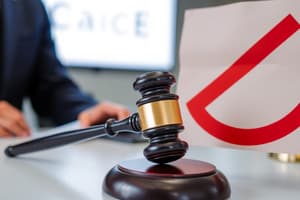Podcast
Questions and Answers
The prosecution authorities can conduct interviews during the ______ of the case.
The prosecution authorities can conduct interviews during the ______ of the case.
hearings
Prosecuting authorities can summon witnesses to appear and testify under ______.
Prosecuting authorities can summon witnesses to appear and testify under ______.
oath
Those liable for tax can be summoned by the Commissioner of ______ Revenue.
Those liable for tax can be summoned by the Commissioner of ______ Revenue.
Internal
The attendance of an absent witness can be enforced by application to any ______ court.
The attendance of an absent witness can be enforced by application to any ______ court.
Witnesses can produce books, papers, records, or other data as specified in the ______.
Witnesses can produce books, papers, records, or other data as specified in the ______.
Flashcards
Prosecution Interview Powers
Prosecution Interview Powers
Prosecution authorities (and their deputies) have the legal right to question individuals during investigations or court hearings. They can administer oaths for witness statements and gather oral testimony.
Subpoena Power
Subpoena Power
Prosecution authorities can compel individuals to appear in court and provide evidence under oath by issuing a subpoena. This power extends to both witnesses and absent or reluctant individuals.
CIR Summoning Power
CIR Summoning Power
The Commissioner of Internal Revenue (CIR) has the authority to summon taxpayers, those required to file tax returns, and related employees to appear for questioning, produce documents, and provide testimony.
IRS Summons Scope
IRS Summons Scope
Signup and view all the flashcards
Tax Code and CIR Power
Tax Code and CIR Power
Signup and view all the flashcards
Study Notes
Prosecution Authorities' Powers
- Prosecution authorities (and deputies) can conduct interviews during case hearings or investigations.
- They can gather witness statements under oath or take oral evidence.
- They can use subpoenas to compel witnesses' attendance and testimony.
- Absent or uncooperative witness attendance can be enforced by court application (section 9(b)).
Tax Code Violations
- For tax code violations, the Commissioner of Internal Revenue can summon those liable for taxes or required to file returns.
- Summoned individuals can also include related officers/employees.
- Individuals must appear at the specified time and place before the Commissioner or his representative.
- They must produce relevant documents (books, papers, records, and other data) and give testimony (section 5(C)).
Studying That Suits You
Use AI to generate personalized quizzes and flashcards to suit your learning preferences.




